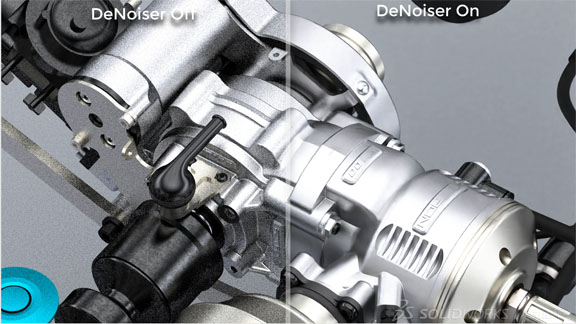
Preview of a feature in SOLIDWORKS 2019, showing SOLIDWORKS Visualize rendering an assembly with AI-powered noise removal from NVIDIA (image courtesy of SolidWorks).
Latest News
February 9, 2018
On Monday, SolidWorks CEO Gian Paolo Bassi and Dassault Systemes CEO Bernard Charles entered the SolidWorks World 2018 (SWW18) convention in a whimsical fashion—riding a steampunk carriage dubbed A Moveable Feast, the creation Two Bit Circus.
Two Bit Circus is, to use the creators’ own words, “a band of mad scientists, roboticists, visual artists, and storytellers ... [who mix their] multiple disciplines into a breathtaking fusion of science, technology and creativity.”
For the mad scientists, roboticists, engineers, and designers assembled inside the LA Convention Center, SolidWorks has ample announcements this week. A robust mix of new offerings and partnerships punctuated the keynotes and customer showcases.
Dassault Systemes, the Paris-headquartered parent company of SolidWorks, is steadily building up capacities in its 3DEXPERIENCE Marketplace, to do in manufacturing what Amazon has done with the books and consumer goods industry. The products and services from SolidWorks are interwoven into Dassault Systemes’ vision.
That means SolidWorks, which sprung into existence as a design software developer in the mid-90s, is swiftly moving toward the manufacturing floor, into the real of making things.
 SolidWorks and Dassault Systemes executives arrived on the Movable Feast, a creation of Two Bit Circus (image courtesy of SolidWorks).
SolidWorks and Dassault Systemes executives arrived on the Movable Feast, a creation of Two Bit Circus (image courtesy of SolidWorks).
 Preview of a feature in SOLIDWORKS 2019, showing SOLIDWORKS Visualize rendering an assembly with AI-powered noise removal from NVIDIA (image courtesy of SolidWorks).
Preview of a feature in SOLIDWORKS 2019, showing SOLIDWORKS Visualize rendering an assembly with AI-powered noise removal from NVIDIA (image courtesy of SolidWorks).
 Desktop Metal’s Live Parts offer optimized part geometry by growing materials where necessary (image courtesy of Deskto Metal).
Desktop Metal’s Live Parts offer optimized part geometry by growing materials where necessary (image courtesy of Deskto Metal).Variations on the Mechanical Theme: Browser, Hybrid, and Desktop
SolidWorks began as a single-product CAD company, but over time, it dipped its toe into product data management, acquired its way into simulation, and expanded into electrical design and manufacturing through partnerships. Though still best known for its original SOLIDWORKS-brand mechanical CAD software, the company now wraps its arms around SOLIDWORKS PDM, SOLIDWORKS Simulation, SOLIDWORKS PCB, SOLIDWORKS Electrical 3D, CircuitWorks, SOLIDWORKS CAM, and more.
The browser-based mechanical modeler xDesign, first previewed at SWW16 two years ago, is a critical piece in the company’s evolution from the desktop-centric mode to cloud-friendly platforms. This year, long-time SOLIDWORKS user Ed Gebo recounted his experience using xDesign.
“[With both parts and assemblies,] xDesign opens files in just about the same amount of time, which I thought was amazing,” noted Gebo. According to a SolidWorks blog post, “currently, about 20 users are experimenting with xDesign, but the plan is to reach 7,000 users by the end of 2018.”
This year, SolidWorks announced another product, dubbed SOLIDWORKS Product Designer. According to the company blog post, “Natively developed on the 3DEXPERIENCE platform, SOLIDWORKS Product Designer brings a complete set of design capabilities including Parts, Assemblies, Sheet Metal, Motion Simulation, and Drawings.”
“SW Product Designer is hybrid,” clarified Suchit Jain, VP of community and strategy for SolidWorks. “It has a rich desktop client, but all the data is in the cloud. The data model is the same for both xDesign and Product Designer. That means, you can start a part in the browser [in xDesign], then finish it in Product Designer.”
xDesign and classic SOLIDWORKS are fundamentally different, from their cloud and desktop setup to their focus: xDesign for conceptual design phase; SW classic for detailed mechanical design destined for production. As a desktop-cloud hybrid product, SW Product Design sits between the two. At the present, it’s still unclear how much of xDesign or SW classic is duplicated in SW Product Design, or how much more new features and contents are exclusive to SW Product Design.
 SolidWorks CEO Gian Paolo Bassi introduced SOLIDWORKS Product Designer, gave updates on SOLIDWORKS xDesign (image courtesy of SolidWorks).
SolidWorks CEO Gian Paolo Bassi introduced SOLIDWORKS Product Designer, gave updates on SOLIDWORKS xDesign (image courtesy of SolidWorks).HP and SOLIDWORKS
During the SWW18 keynote, Stephen Nigro, president of HP’s 3D printing business, appeared alongside Bassi to unveil the early 3D printers from its Multi Jet Fusion (MJF) 300 and 500 series.
Though an established name in the workstation and inkjet printer market, HP is a relative newcomer to the 3D printing sector. The company describes its technology as “voxel-based printing.” Whereas a pixel defines the location of an element in 2D space, a voxel defines it in the 3D space. With Voxel-level control, MJF printers could theoretically produce parts with different stiffness, color, and texture for every voxel.
But to fully realize the MJF promise, HP needs CAD vendors’ support. “Today there’s no software that controls materials at the voxel level,” noted Bassi. “We can bring forward new capabilities in 3D printing technology, but somebody has to create the tool to let designers take advantage of them,” said Nigro.
In the partnership announcement issued this week, HP said, “[HP and Dassault Systemes] intend to optimize Dassault Systèmes’ industry-leading SOLIDWORKS 3D design and engineering applications to take advantage of the unique voxel-level capabilities of HP’s MJF 3D printing solutions.”
3D Systemes and SOLIDWORKS
3D Systems, an established market leader in 3D printing, already has in its portfolio an additive manufacturing (AM) design software program. The company describes 3DXpert as an “all-in-one solution for metal additive manufacturing.”
At SWW18, 3D Systemes CEO Vyomesh Joshi (VJ) joined Bassi in a press conference to announce 3DXpert for SOLIDWORKS, developed to let SOLIDWORKS users prepare and optimize their design for AM projects. “I believe [3DXpert for SW] is the tool to democratize 3D printing,” said VJ.
Whereas 3DXpert is a standalone product developed solely for metal-based AM, 3DXpert for SOLIDWORKS is nested inside SOLIDWORKS CAD software, developed to address both metal- and plastic-based AM production.
Desktop Metal and SOLIDWORKS
Newcomer Desktop Metal, which aims to deliver mass production systems for metal-based 3D printing, is another one to announce a partnership with SolidWorks. In addition to its own AM hardware, Desktop Metal is also developing a software program for AM, called LiveParts.
Whereas most topology optimization programs concentrates on removing excess materials from the based geometry to arrive at optimal geometry, LiveParts takes the opposite approach. Using classic finite element analysis methods, it grows geometry where necessary to arrive at the best geometry. The additive approach is in line with the additive manufacturing (AM) process, which builds parts by depositing materials, the company executives explained in a press conference.
The two companies are forming a strategic partnership “to advance design for additive manufacturing (DfAM) through education and an integration between SOLIDWORKS applications and Desktop Metal systems,” the announcement said.
 3DEXPERIENCE Marketplace Make is populated with a network of qualified on-demand manufacturing service providers (image courtesy of SolidWorks).
3DEXPERIENCE Marketplace Make is populated with a network of qualified on-demand manufacturing service providers (image courtesy of SolidWorks).
 3DEXPERIENCE Marketplace Part Supply is populated with 3D components and parts from the supplier network (image courtesy of SolidWorks).
3DEXPERIENCE Marketplace Part Supply is populated with 3D components and parts from the supplier network (image courtesy of SolidWorks).Community and Services
SWW Day One’s announcements also included the launch of 3DEXPERIENCE Social Collaborative Services and 3DEXPERIENCE Marketplace Make. The former is, as the name suggests, social media-style collaboration tools. The latter brings on-demand manufacturing, to connect designers with a variety of manufacturing services providers (both subtractive and additive).
The two are part of 3DEXPERIENCE Marketplace, a larger portal that also includes 3DEXPERIENCE Marketplace Parts Supply. Users will be able to search, both by shape and by meta data, the desired 3D components from part suppliers who are part of the network. The Marketplace Parts Supply library also incorporates 3D Content Central, an established part library associated with the SOLIDWORKS user community.
“With a few clicks, you’d be able to submit your part and have it made by one of the providers from around the world that we have selected and qualified,” said Bassi. “In your browser, just like on Amazon, you can specify what you want.”
3DEXPERIENCE Marketplace Make is now online, available to take orders. On-demand service providers such as Xometry and Plethora, and designer-vendor matchmaking sites like Fictiv could become part of Marketplace Make, explained Jain.
“The goal of Marketplace Make is to have certified suppliers, including small shops, big shops, and service bureaus,” Jain added. “The platform will be integrated with both SOLIDWORKS and CATIA.” It is, however, not exclusive to parts created in Dassault Systemes products. Make vendors will service all parts created in the supported CAD and neutral 3D file formats.
The ambition of 3DEXPERIENCE Marketplace, stated a number of SolidWorks executives in their key notes and press conferences, is to become “the Amazon of manufacturing,” with the same broad appeal and scope of services offered.
Subscribe to our FREE magazine, FREE email newsletters or both!
Latest News
About the Author
Kenneth Wong is Digital Engineering’s resident blogger and senior editor. Email him at [email protected] or share your thoughts on this article at digitaleng.news/facebook.
Follow DE





